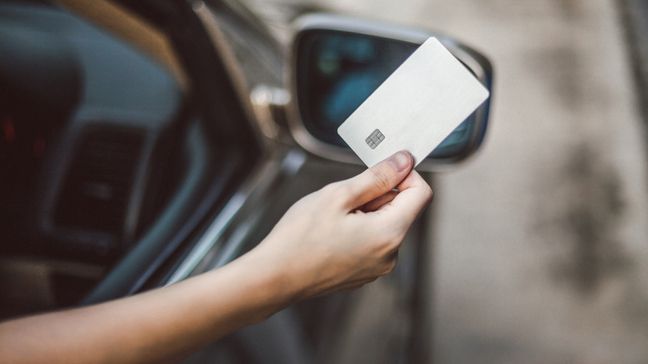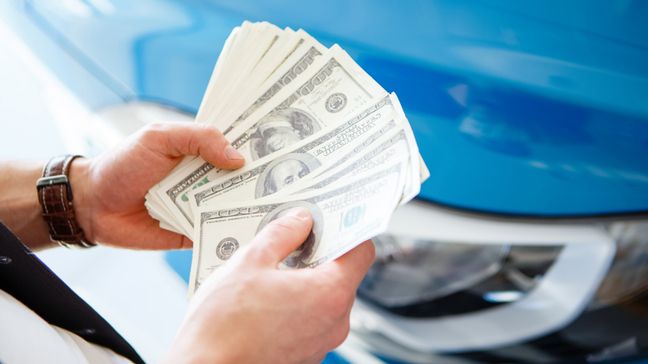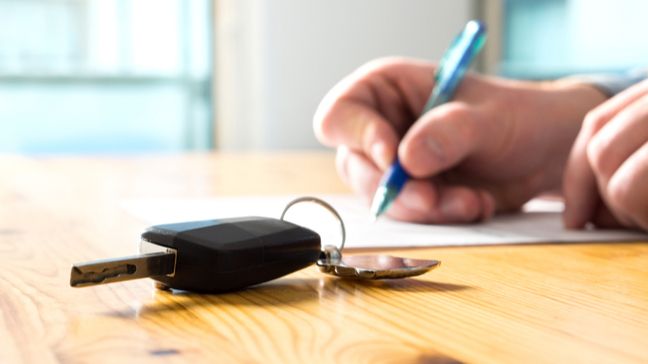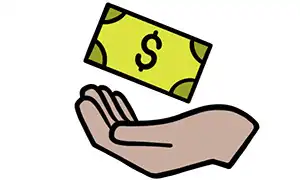Buying your first car can be overwhelming. When I buy a car, I spend so much time finding the perfect vehicle, making sure it is mechanically sound, and trying to negotiate the ideal price.
Once you do all of that, it’s time to actually pay for the car. Unfortunately, most people don’t spend as much time thinking about how they’ll pay for the car as they do trying to find it. That can be a mistake.
For some people, the idea of paying for a car with a credit card seems like a decent option. Maybe you’ll earn a credit card sign-up bonus, regular credit card rewards, or simply want to take advantage of an introductory 0% APR period on purchases.
I’ll admit, these options sound attractive to me. I am a credit card enthusiast, after all. While these ideas seem good in theory, they’re almost never a good idea. Here’s why.
Why you shouldn’t use a credit card to pay for a car

In an ideal world where everything works out perfectly according to your plan, paying for a car with a credit card wouldn’t be the end of the world. Sadly, things rarely go according to plan.
Credit cards have very high interest rates
The number one reason to avoid paying for your car with a credit card is the average interest rate credit cards carry. According to the Federal Reserve, the average credit card interest rate in the second quarter of 2020 was 14.52%. If your credit is less than stellar, expect your interest rates to be much higher.
You can’t rely on 0% APRs
If you can’t pay off the car purchase before a 0% APR introductory offer period on purchases expires, you’re going to pay quite a bit of interest on your car purchase. To make matters worse, the small minimum payments typically required on credit cards could give you the false sense of security that the debt isn’t as bad as it really is.
It just isn’t going to be easy
Of course, the above points don’t even consider the fact that buying a car with a credit card isn’t going to be easy. Most car dealerships won’t let you pay for a whole car with a credit card because of the processing fees they have to pay. I know because I’ve asked. The most the new car dealership I asked would allow on a credit card was $5,000.
It could hurt your credit
If you find a dealership that will let you pay via credit card, your credit card provider might deny the transaction as fraud. Even if you get around all of these issues, your credit limit may not be high enough to cover the entire purchase. Putting a large balance on your credit card could spike your credit utilization ratio, damaging your credit score, too.
It usually isn’t worth the hassle between high interest rates and the several barriers to paying for a car with a credit card. So what should you do instead? You have several options. Depending on where you are in your financial life, they may not all be available. However, you can strive toward achieving them in the future.
The ideal option? Pay cash

In a perfect world, you’d buy a car with cash. Unless you’ve been saving for a while, chances are this isn’t an option. But why is buying a car with cash ideal?
When you pay for a car in cash, you don’t have to pay any interest to a lender. What’s even better is you don’t have a monthly car payment. You can instead use that money to save up to buy your next car in cash. If you’re lucky enough to fill up a car replacement fund before you need to replace your vehicle, you can then use the extra money in your monthly budget to fulfill other goals.
Getting to a point where you can buy a car with cash is more accessible than most people think. Rather than trading your car in when you pay off your loan, keep your car as long as possible. Then, take your old car payment and put it in a savings account each month.
When your car is no longer reliable enough to keep, use the cash in your account to buy a cash car. It may not be the best, but find something reliable. Then, continue saving money for your next vehicle. With each purchase, you can hopefully upgrade to a nicer car.
If you don’t have the cash to buy a car today, don’t worry. You have other options, too.
Consider a personal loan
If you can’t get a car loan or don’t want to get one for whatever reason, you could consider a personal loan. This is unsecured debt, which means you’ll usually pay a higher interest rate.
The Federal Reserve found two-year personal loan interest rates were 12.17% in the as of the third quarter of 2023. This is higher than car loan interest rates but lower than credit card interest rates.
See great personal loan rates you qualify for in minutes from our trusted lending partners.
This service performs a soft credit check so there's no impact to your credit score, and never any obligation to request or take the loan.
- Won't affect your credit score
- Check your APR and loan amount before you apply
- Access to multiple lending partners
- Personal information required to see rates
- High APRs for applicants with fair or low credit
Or get an auto loan

If you can’t pay cash, a car loan is usually the next best option. These loans are secured by the vehicle you’re purchasing. This means if you miss payments, the lender could repossess your car. That doesn’t sound ideal, but it actually works in your favor in one crucial way.
Lenders prefer you borrow money with a secured asset (the car) because it leaves them with less risk that you won’t pay them back. In return, you usually get a lower interest rate on a secured loan than an unsecured loan, such as a credit card or personal loan.
In fact, new five-year car loans had an average interest rate of 5.14% in the second quarter of 2020, according to the Federal Reserve. This is over 9% lower than the average credit card interest rate. That means significant savings on the amount of interest you pay.
Sometimes you can get even better rates from new car dealerships if you have spotless credit. Believe it or not, I’ve actually been able to get car loans with 0% and 0.9% financing due to special offers from car manufacturers.
Used car loans usually come with slightly higher interest rates than new car loans. Even so, it’s nowhere near the interest rates on credit cards or personal loans. Of course, car loan interest rates are based on your credit history. If you don’t have excellent credit, expect higher rates on car loans.
Summary
In an ideal world, you could buy a car with cash. Most people can’t do that, though. The next best option is a car loan, followed by a personal loan. A credit card is almost never a good option to buy a car, even if the credit card rewards are tempting
